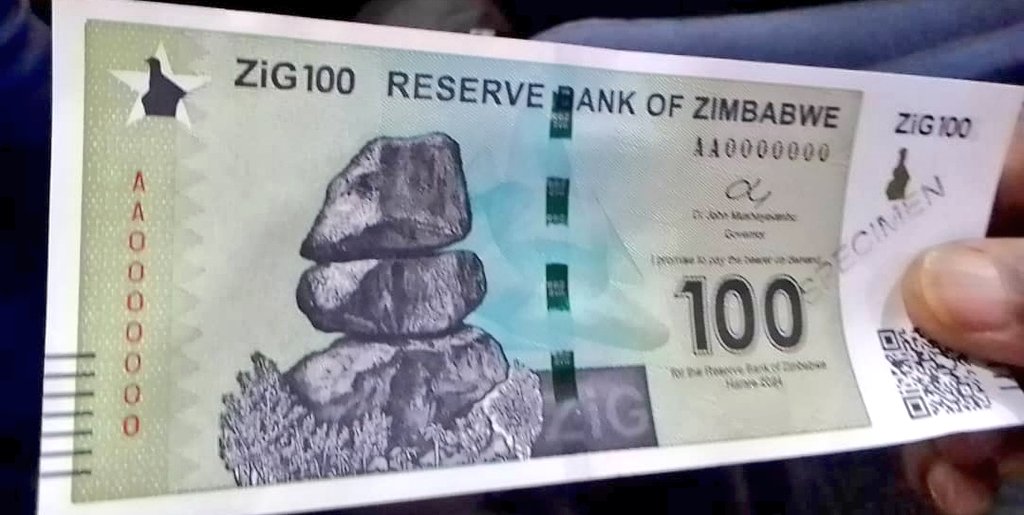Zimbabwe’s newly-introduced structured currency, known as ZiG, short for Zimbabwe Gold, failed before it was even launched, an economic commentator has said.
Reserve Bank of Zimbabwe (RBZ) Governor John Mushayavanhu on Friday, April 05, announced the introduction of ZiG, which replaced the worthless Zimbabwe dollar.
However, economist Gift Mugano said the new currency failed before it was launched mainly because sufficient reserves did not back it.
Mugano said the genesis of Zimbabwe’s currency crisis started on 14 November 1997 when the ZW$ crashed – the Black Friday.
Since then, the ZANU PF-led Government moved from the Zimbabwe dollar (the currency adopted at independence in 1980) to USD (in 2009), Bond (in 2016), RTGS (2019 – February), ZWL$ (2019 – June), back to USD in 2020 and now to ZiG, although the latter is part of a multi-currency system. Said Mugano:
At each and every point when these currencies were introduced, we witnessed massive disagreements clearly drawn on political lines and serious disregard for the experts’ views.
Like now, we are telling you that ZiG will fail dismally and you are busy defending a currency which was dead before it was announced.
So, we haven’t learnt anything in the last +26 years of the currency crisis?
One Nyasha Musandu said the introduction of ZiG will not succeed as the Government lacks sincerity. She wrote on X:
It worries me how many people actually think the government is being sincere with this ZiG thing. I see so much analysis and justification, and I just think to myself, we have been here before so many times. What are we failing to learn?
Meanwhile, in a post on X, Mugano outlines seven factors which he believes will undermine ZiG namely (1) a large informal sector (+80% of the economy); (2) drought of confidence; (3) drought of production; (4) printing of money & excessive liquidity caused by treasury; (5) lack of national cohesion and consensus; (6) lack of policy clarity; and (7) external shocks (drought & subdued commodity prices). He added:
The MPS presented by the new Governor today reminds me of the MPS which was presented by Dr JP Mangudya on 20 February 2019 where the later introduced the RTGS as the new currency with a starting exchange rate of ZW$2.5: US$1 (interbank rate/market).
Immediately, the exchange rate started to run away and today the ZW was trading at ZWL$40,000: US$1.
This is exactly what is going to happen to ZiG!
Over and above the 7 points raised above, the existence of the USD in the market (although unavoidable), is the worst enemy of ZiG. ZiG can’t compete with the USD in the market.
As long as ZiG is not accepted/used exclusively at fuel stations, passport offices, ZIMRA (payment of duties & taxes), schools, tuckshops, etc then forget about ZiG.
Most importantly, if individuals/anyone can’t walk into a bank and buy /sell foreign currency the same way they do in the informal market/black market at an attractive rate, then forget about ZiG.
Another serious threat to ZiG which requires special attention is excessive liquidity from the Ministry of Finance going towards payment of contractors & civil servants salaries. The approved 2024 budget stood at ZWL$58.2 trillion albeit it is eroded by inflation & exchange rate spiral.
The RBZ in its MPS presentation, placed emphasis on the fact that the total reserves in its coffers amount to US$285 million are more than 3 times the current reserve money, i.e., ZW$2.6 trillion (equivalent of US$90 million). This is a correct assessment.
However, the RBZ is obviously not factoring in the impact of the excessive liquidity from the Treasury. Obviously, with the exchange rate movement which has seen the official exchange rate slipping from ZWL$6K from the day when the 2024 budget was launched to ZWL$25K as of this week, it means that our budget shrunk by more than 4 times in 3 months.
The converse is true – it is implied that the budget has moved from ZW$58.2 trillion by four (4) times – so we may be talking of a realistic budget of ZWL$240 trillion.
The question which arises is that when RBZ is presenting its MPS, isn’t prudent that it must also raise a point of advice to the Treasury (as an advisor to GOZ) on the possible implications of liquidity on the exchange rate.
Likewise, isn’t it fair to request the RBZ to give us a balanced assessment of the impact of reserve money & excess liquidity from the treasury on the exchange rate rather than concentrate on the reserve money supply only?
I would like to argue that the national budget has always been and will always be the biggest threat to the exchange rate stability – more than money supply.
The question which arises again is whether the US$285 million is enough to cover USD demand (demand for value preservation) from civil servants & contractors. The answer is a big no!
ZiG = bond note = ZWL = RTGS = FAILURE
